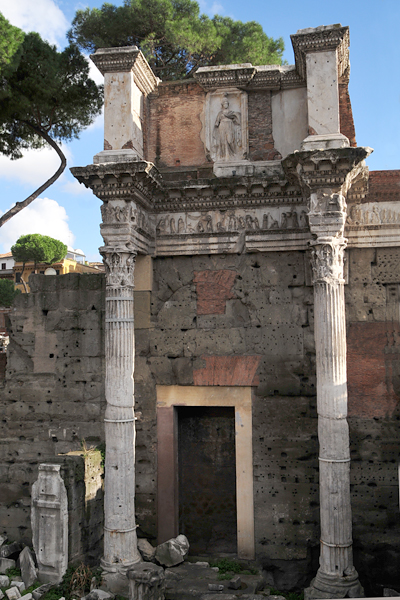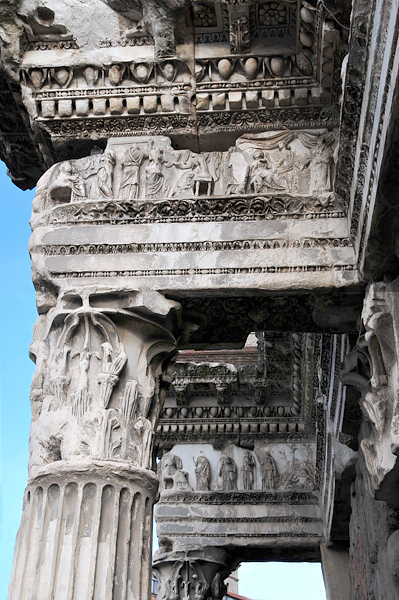
Substituting for the porticoes of the other forums, the lateral walls of the Forum Transitorium had a series of slender Corinthian columns en ressaut, the entablature and attic projecting out over each to form a series of thirty-eight bays. Only one surviving pair of columns remains, known as Le Colonnacce, which still stands next to the temple pronaos. In the attic is a helmeted figure traditionally identified as Minerva, who was considered by Domitian to be his divine patron. Fragments of another female figure are thought to be one of the personification of the Roman provinces, symbolizing the unification of the empire.
| Along the entablature is a frieze that shows Minerva in the company of women spinning and weaving, the
arts and crafts over which the goddess presided. The myth of Arachne also is depicted, who, relates Ovid (Metamorphoses, VI),
had challenged Minerva to a weaving competition and, for her effrontery, was transformed into a spider, condemned to weave her web
forever, although none of this is shown on the little of the frieze that survives. In the bay immediately beneath the figure of
Minerva, the goddess is shown striking a kneeling woman who has been identified as Arachne, flanked by moralizing exempla of virtuous
women attending to household chores.
D'Ambra reads the frieze as associating domestic virtues with imperial ideals: the punishment of Arachne as an expression of both divine and imperial authority, and the representation of women in their traditional roles as part of Domitian's campaign for moral reform. It is a curious theme, one more suited to the private realm than the sculptural program of a public monument. Too, the myth is conveyed only by Ovid, whose work had been banned from the libraries of Rome for undermining the moral reform of Augustus, and one wonders to what extent Arachne actually is emphasized on the frieze. In his zeal to enforce chastity, Domitian had two vestal virgins executed and the chief vestal buried alive for breaking their vows (Suetonius, VIII). He also seduced his niece, who died when she was forced to undergo an abortion (XII). |
 |
Reference: Private Lives, Imperial Virtues: The Frieze of the Forum Transitorium in Rome (1993) by Eve D'Ambra.
See also Vestal Virgins.